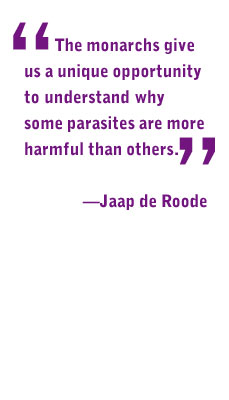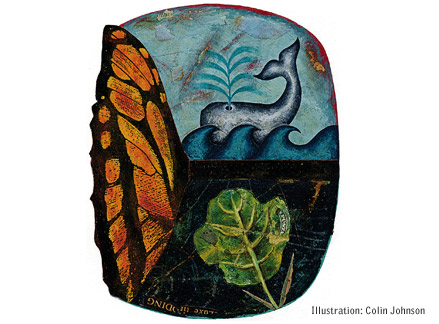


Survivor: Piece of an Evolutionary Puzzle
by Laurie Anderson


In the popular reality television show "Survivor," groups of contestants compete for supremacy in a natural environment. At the end of each season, viewers are left to contemplate why one contestant survived and the others did not. Jaap de Roode of the Institute of Ecology is holding his own version of the show, but his subjects are butterflies and mosquitoes and the parasites that they host.
"Parasites depend on their hosts for survival,” said de Roode, "so intuitively, they should be nice to their hosts." Yet many parasites harm and even kill the host, a characteristic known as virulence. Virulence may evolve when multiple different strains of the same parasite species invade one host and must compete with one another for survival. Scientists believe that the more aggressive strain usually wins, which may spell a different outcome for the host.
The European Commission awarded de Roode a Marie Curie Outgoing International Fellowship to test this fundamental and unresolved puzzle in evolutionary biology. His work begins with studying the factors that affect the virulence of competing strains of a protozoan parasite in monarch butterflies.
Recent studies have shown that migratory populations of monarch butterflies, some of which travel thousands of miles to reproduce, harbor fewer parasites than more sedentary monarchs. It follows that, as monarch butterfly habitat continues to shrink and once-large migratory populations are replaced with smaller, more sedentary ones, parasites may have to compete more, and virulence may increase dramatically.

"The monarchs give us a unique opportunity to understand why some parasites are more harmful than others," said de Roode. "We'll look next at mosquitoes and the parasites that cause malaria to see if the same principles hold."
Understanding the evolution of virulence is no game, de Roode said. His results could help predict the efficacy of human interventions and aid in the design of new, efficient ways to combat disease.“Many human interventions aimed at reducing malaria, such as bed nets, drugs and vaccines, will most likely reduce the number of competing malaria strains per mosquito.” This could lead to reduced virulence, said de Roode, but if the hosts live longer, they'll have longer to transmit harmful malaria-causing parasites to humans. Worldwide, malaria infects 200 million to 300 million people each year, with 2 million to 3 million deaths.
"The study should increase our understanding of the factors that shape parasite virulence, with important implications for conservation," said de Roode. "It is my hope that this study also will contribute positively to disease control policy aimed at improving human health." In which case, everyone will be an "ultimate survivor."
For more information, contact Laurie Anderson at laurie@uga.edu.
For comments or for information please e-mail: rcomm@uga.edu
To contact the webmaster please email: ovprweb@uga.edu
![]()